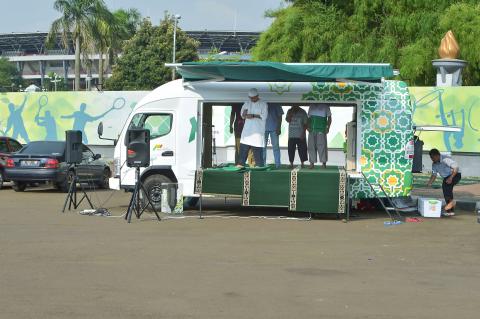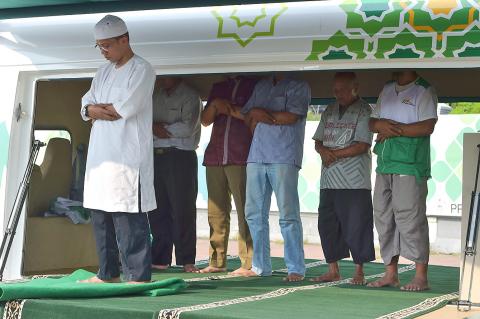As the call to prayer rang out across the Indonesian capital, Sutikno faced a dilemma — the devout Muslim needed to set off through Jakarta’s notorious traffic to pick up his wife but did not want to miss out on worshipping. However for him and others juggling the demands of hectic, 21st century life and piety in the crowded capital of the world’s most populous Muslim-majority country, a solution has just pulled up.
The “mosque-mobile” started cruising through Jakarta last month as the Islamic holy month of Ramadan drew to a close, aiming to ensure Muslims did not miss out on prayers by setting up in busy places, such as near festivals and sports events.
Sutikno, a middle-aged office worker who like many Indonesians goes by one name, came across the van parked between a sports stadium and shopping malls, and it proved a godsend.

Photo: Adek Berry/AFP
“I was supposed to go to a mosque that is quite far away but then I saw this one,” he told AFP. “I just parked my car and performed my prayers here. I can save time and go and pick up my wife faster.”
The green-and-white van has been specially adapted to become a mobile place of worship. At prayer time, the sides of the vehicle open up and a small stage is extended, from which the imam preaches. Prayer rugs are rolled out in front of the van, with space for up to 100 people, and a handful can worship inside the vehicle. It also provides special robes for women and a tank of water for the faithful to ritually cleanse themselves before praying.
The mosque started operating in Jakarta with a team of four in the final week of Ramadan, a month of fasting and piety, but plans to continue afterwards. The van offers its services between 3pm and 7pm for two prayer sessions, at a time traffic is bad as millions flood out of downtown areas and head back to satellite cities. Muslims are supposed to pray five times a day.

Photo: Adek Berry/AFP
During Ramadan, the crew running the Jakarta mosque-mobile also serve snacks to people stuck in gridlock when it is time to break their fast.
The van is run by the Archipelago Mosque Foundation, an organization that sets up and maintains mosques, with funding provided by Adira Sharia, a group that provides Islamic-compliant financing for motor vehicles.
“We were concerned that there was a lack of places of worship at crowded spots such as music concerts, festivals and football games. Sometimes people intend to pray, but because there are no facilities, they skip it,” said Hamzah Fatdri, director of the mosque foundation.
The Jakarta mosque-on-wheels has hit the streets after the foundation launched a mobile place of worship in the city of Bandung, southeast of the capital on the main island of Java.
The Bandung mosque proved a success, offering prayer sessions at 50 different locations in its first year of operation, and the foundation hopes the van in the capital — which is slightly larger than the Bandung model — can do even better.
Indonesia is already home to some 800,000 mosques, including a large number in Jakarta and other major cities.
But with many people stuck in gridlock at prayer time — particularly during Ramadan — and ad hoc festivals and sports events typically failing to provide facilities for praying, the foundation believes the “mobile-mosque” will be a great help.
It is the latest innovation to offer relief to residents of Indonesia’s booming but overcrowded, traffic-choked cities, where hundreds of new vehicles are hitting the roads every day as the middle class rapidly expands due to strong economic growth.
Motorbike taxi-hailing apps that whisk passengers quickly through the gridlock have been a chief beneficiary, and have expanded their businesses into other areas such as food delivery and courier services.
Still, some worshippers were not immediately taken by the mosque-on-wheels.
“Maybe because this was a new experience, I felt a bit awkward and embarrassed to pray in an open, public space,” student Mahtashal Harbi said after worshipping for the first time at the Jakarta van.

One of the most important gripes that Taiwanese have about the Democratic Progressive Party (DPP) is that it has failed to deliver concretely on higher wages, housing prices and other bread-and-butter issues. The parallel complaint is that the DPP cares only about glamor issues, such as removing markers of Chinese Nationalist Party (KMT) colonialism by renaming them, or what the KMT codes as “de-Sinification.” Once again, as a critical election looms, the DPP is presenting evidence for that charge. The KMT was quick to jump on the recent proposal of the Ministry of the Interior (MOI) to rename roads that symbolize

On the evening of June 1, Control Yuan Secretary-General Lee Chun-yi (李俊俋) apologized and resigned in disgrace. His crime was instructing his driver to use a Control Yuan vehicle to transport his dog to a pet grooming salon. The Control Yuan is the government branch that investigates, audits and impeaches government officials for, among other things, misuse of government funds, so his misuse of a government vehicle was highly inappropriate. If this story were told to anyone living in the golden era of swaggering gangsters, flashy nouveau riche businessmen, and corrupt “black gold” politics of the 1980s and 1990s, they would have laughed.

It was just before 6am on a sunny November morning and I could hardly contain my excitement as I arrived at the wharf where I would catch the boat to one of Penghu’s most difficult-to-access islands, a trip that had been on my list for nearly a decade. Little did I know, my dream would soon be crushed. Unsure about which boat was heading to Huayu (花嶼), I found someone who appeared to be a local and asked if this was the right place to wait. “Oh, the boat to Huayu’s been canceled today,” she told me. I couldn’t believe my ears. Surely,

When Lisa, 20, laces into her ultra-high heels for her shift at a strip club in Ukraine’s Kharkiv, she knows that aside from dancing, she will have to comfort traumatized soldiers. Since Russia’s 2022 invasion, exhausted troops are the main clientele of the Flash Dancers club in the center of the northeastern city, just 20 kilometers from Russian forces. For some customers, it provides an “escape” from the war, said Valerya Zavatska — a 25-year-old law graduate who runs the club with her mother, an ex-dancer. But many are not there just for the show. They “want to talk about what hurts,” she